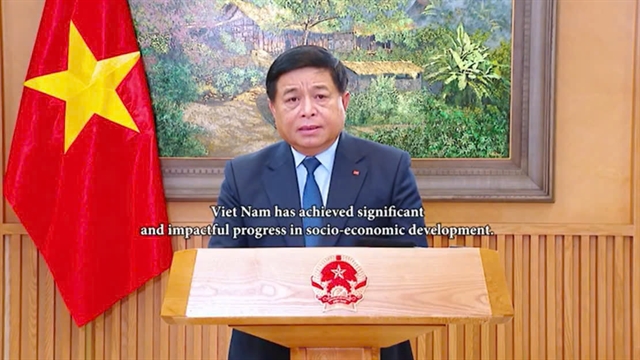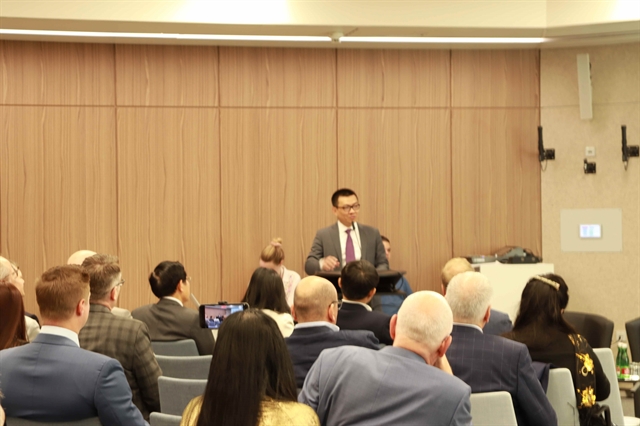 Politics & Law
Politics & Law

N
 |
| Deputy Prime Minister Nguyễn Chí Dũng delivers an online speech at the forum. - Photo courtesy of NIC |
VIENNA - Deputy Prime Minister Nguyễn Chí Dũng emphasised Việt Nam government's commitment to developing an innovation ecosystem and fostering international technology cooperation.
Delivering an online speech during the 'Austria - Việt Nam High-Technology and Innovation' forum held on May 16 in Vienna, Austria, Deputy Prime Minister Dũng noted that over 50 years of friendly relations have made Việt Nam and Austria significant trade partners, creating a solid foundation for future collaboration.
The Deputy PM also praised Austria's advancements in core technologies, including quantum computing, biology, semiconductors and artificial intelligence.
Dũng outlined Việt Nam's ambition to become a high-income developed country by 2045, emphasising that science and technology (S&T) and innovation are crucial for driving economic growth and enhancing competitiveness.
To achieve these goals, Việt Nam is focused on removing institutional barriers, streamlining regulations to facilitate innovation, developing the necessary facilities to support S&T advancements and building a skilled workforce to meet evolving demands.
He proposed four key areas for cooperation with Austria by focusing on AI, semiconductors, quantum technology and biotechnology, including the establishment of R&D centres and human resource training. Implementing programmes to support digital transformation for small and medium-sized enterprises (SMEs), collaborating on green hydrogen technologies and new solutions for small power plants and supporting start-ups and fostering public-private partnerships.
Dũng also urged the Austrian government, universities and research institutes to provide scholarships for Vietnamese students and to support start-ups in Việt Nam, aiming to build networks of experts to advance technological capabilities in the country.
.JPG) |
| Participants at the forum. - VNA/VNS Photo |
During the conference, Vietnamese Ambassador to Austria Vũ Lê Thái Hoàng highlighted the unique opportunities for cooperation in high technology, digital technology, and innovation between Việt Nam and Austria. He noted that this period presents favourable conditions for both nations despite living in a volatile world.
The ambassador emphasised that Việt Nam is actively transforming into a technology and innovation-driven nation, while Austria is emerging as a developed economy focused on science and technology, positioning itself as a digital technology hub in Europe.
 |
| Vietnamese Ambassador to Austria Vũ Lê Thái Hoàng gives a seech at the forum. -- VNA/VNS Photo |
He pointed out that Việt Nam is a promising market with clear investment priorities outlined in Resolution 57, which includes key sectors such as artificial intelligence (AI), big data, semiconductors and microchips, automation, biotechnology, blockchain, Internet of Things (IoT) and new generation mobile networks (5G, 6G).
With a young population of over 100 million and a strategic location as the 'gateway' to Southeast Asia, Việt Nam is increasingly becoming an attractive destination for global technology corporations.
At the forum, Võ Xuân Hoài, Deputy Director of the National Innovation Centre (NIC), reiterated Việt Nam's commitment to international cooperation in enhancing technology and innovation. He pointed out the importance of partnering with Austria, known for its strengths in core technology R&D, to support Việt Nam's strategic industries, including semiconductors, AI, quantum technology and clean energy.
In an interview with VNA correspondents, Professor Karen Lips, Deputy Director of the International Institute for Applied Systems Analysis (IIASA), highlighted the potential for collaboration with Viet Nam, citing IIASA's scientific expertise and global network. She noted that IIASA offers a unique combination of analytical tools and collaborative opportunities essential for developing impactful solutions to global challenges.
As an international research organisation with Viet Nam as a member, IIASA provides a neutral space for discussing cross-border scientific initiatives, particularly on issues like climate change, energy security and sustainable development. Professor Lips emphasised the importance of global cooperation based on scientific knowledge, positioning IIASA as an ideal environment for fostering such collaboration.
The forum aimed to establish strategic cooperation in technology, innovation, and digital transformation, promoting a sustainable cooperation ecosystem that encourages knowledge and resource sharing between the two nations. Organised by the Vietnamese Embassy in Austria, the event involved the National Innovation Centre (NIC) and the Austrian Chamber of Commerce (WKO), featuring prominent companies like Infineon Technologies Austria, Dynatrace, and TTTech, alongside leading Vietnamese enterprises such as FPT and VNPT.
The forum served as a platform for substantive dialogue among business leaders, policymakers, and researchers from both countries, reinforcing Việt Nam's role as a key player in the global innovation value chain. It also aimed to attract 'technology eagles' from Austria and Europe seeking investment opportunities in Southeast Asia while laying the groundwork for deeper cooperation in technology transfer, high-quality human resource development and a sustainable digital future. -- VNS




